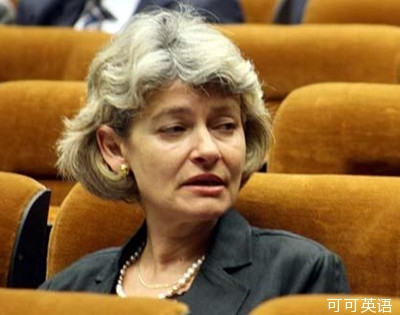Message from Ms Irina Bokova, Director-General of UNESCO, on the Occasion of World Arabic Language Day
教科文組織總干事伊琳娜·博科娃在世界阿拉伯文日的致辭
18 December 2013
2013年12月18日
World Arabic Language Day is an opportunity for us to acknowledge the immense contribution of the Arabic language to universal culture and to renew our commitment to multilingualism. Linguistic diversity is a key component of cultural diversity. It reflects the wealth of human existence and gives us access to infinite resources so that we may engage in dialogue, learn, develop and live in peace. The Arabic language bears the treasures of ancient Islamic wisdom, and the voice of poets, philosophers and scientists who placed the strength and beauty of the language at the service of humanity, scholars like the great Avicenna, the 1,000th anniversary of whose The Canon of Medicine we celebrate this year. We can mobilize that strength to spread knowledge, encourage mutual understanding and build spaces of cooperation for development and peace. The Arabic language is also our ally as we seek to improve literacy rates and build knowledge societies with 22 Member States of UNESCO.
慶祝阿拉伯文日,就是承認(rèn)阿拉伯文對世界文化的巨大貢獻(xiàn)、重申我們對使用多語制的主張。語言多樣性是文化多樣性的重要內(nèi)容,它反映了人類生活的豐富性,為我們的對話、學(xué)習(xí)、自我發(fā)展及和平生活提供了無盡的資源。阿拉伯文承載著伊斯蘭千百年來的智慧寶藏,詩人、哲學(xué)家和學(xué)者也是借它發(fā)聲、運(yùn)用它的力與美來服務(wù)人類,如偉大的阿維森納,我們今年慶祝了其《醫(yī)典》問世1000周年。我們可以調(diào)動這種力量來傳播知識,鼓勵相互理解,建設(shè)促進(jìn)發(fā)展與和平的合作空間。阿拉伯文還是我們在教科文組織的22個會員國改善掃盲工作、建設(shè)知識社會的盟友。
This year, UNESCO is emphasizing in particular the role of the media in favour of the reach and reinforcement of Arabic. The media are a key agent of public discourse, and UNESCO is committed to supporting the Arab media as forces of dialogue, information and citizenship. We should strengthen training for journalists and support for media development so as to ensure that Arabic is heard and read in the public arena. Initiatives backed by UNESCO, such as the sixth Arab Free Press Forum, held in Tunis in November 2013, and the Arab Bloggers Summit due to be held in January 2014, are additional opportunities to reflect on the situation and needs of the independent, plural Arab press.
今年,教科文組織特別強(qiáng)調(diào)媒體對于推廣和加強(qiáng)阿拉伯文的作用。媒體是公共話語的核心要素,教科文組織堅決支持阿拉伯媒體成為對話、信息和宣傳公民意識的力量。我們應(yīng)加強(qiáng)記者培訓(xùn),支持媒體發(fā)展,在公共空間讓人聽到和讀到阿拉伯文。教科文組織的舉措,如11月在突尼斯舉辦的第六次阿拉伯新聞?wù)搲蛯⒂?014年1月舉行的阿拉伯博主峰會也為思考獨立多元的阿拉伯新聞界狀況和需要提供了機(jī)會。
The media also encourage us to think about the role of languages as prime instruments in collective life and citizenship. The Arabic language and the possibilities it offers can help the citizens of this globalized world to live together in their diversity. Arabic bears the identities and values of 422 million individuals in the world and of 1.5 billion Muslims who use it for their daily prayers. It drives the reinforcement of the values we share. With this in mind, UNESCO supports the International Council for the Arabic Language, whose role is essential in connecting the Arabic-language cultures and cultures of other languages across the world. UNESCO is involved in a number of regional initiatives designed to promote Arabic, such as the e-platform for teachers, Education for the Twenty-First Century, designed to facilitate knowledge sharing. I renew this day our commitment to bolstering the use of Arabic—and thus the impact and scope of our programmes—in UNESCO’s work with its Member States.
媒體也促使我們思考如何發(fā)揮語言這一理想工具的作用來促進(jìn)集體生活和公民意識。阿拉伯文和它提供的可能性有助于全球化的世界的公民在多樣性中共處。阿拉伯文承載著世界上4.22億人和在每日用它禱告的15億穆斯林的特性和價值觀。它是一個加強(qiáng)我們共同價值觀的動力。有鑒于此,教科文組織支持國際阿拉伯文理事會,因為該理事會為連接阿拉伯文文化和世界上其它語言發(fā)揮著重要作用。教科文組織參與了多個旨在促進(jìn)阿拉伯文的地區(qū)行動,如為了促進(jìn)知識分享而設(shè)計的面向教師的電子平臺《21世紀(jì)的教育》。值此世界日,我重申我們將在教科文組織在會員國的工作中加強(qiáng)使用阿拉伯文,這樣做也是在加強(qiáng)我們的各項計劃的影響和聲望。

更多精品翻譯素材,敬請關(guān)注可可英語。











